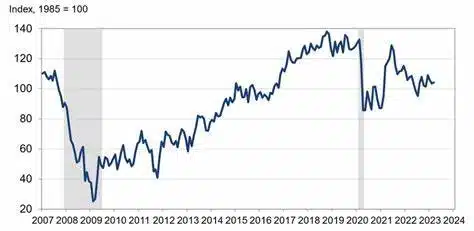The Conference Board surprisingly released a study on Tuesday showing a modest gain in U.S. consumer confidence in the month of March, reflecting an upswing in consumer expectations. The Conference Board said that its consumer confidence index increased slightly from a downwardly revised 103.4 in February to 104.2 in March.
The tiny increase caught economists off guard, as they had predicted that the consumer confidence index would decline from the 102.9 initial reading for the previous month to 101.0. The expectations index increased from a downwardly revised 70.4 in February to 73.0 in March, which coincided with the increase in the headline index. The present situation index fell from an upwardly revised 153.0 in February to 151.1 in March.

Expectations index increased from a downwardly revised 70.4 in February to 73.0 in March, which coincided with the increase in the headline index. The survey also revealed that the present situation index fell from an upwardly revised 153.0 in February to 151.1 in March. Important to note that the survey’s deadline was March 20, which was around 10 days after the bank failures in the US.
The University of Michigan will publish its updated measurement on consumer mood for the month of March on Friday. It is anticipated that the consumer sentiment index for March would be reduced from 63.4, which was down from 67.0 in February, to 63.2.
Conditions and Factors
Inflation remains elevated at around 6% year-on-year, about three times as high as the target rate for policymakers at the U.S. Federal Reserve. Hiring, however, remains resilient. The Labor Department reported that initial claims for unemployment insurance during the week ending March 18 declined by 1,000 from the previous week to reach 191,000 claims. The less-volatile, four-week moving average showed a decrease of 250 from last week’s unrevised level of 196,500. A strong labor market compounds the challenge for the U.S. Federal Reserve, which is trying to arrest consumer-level inflation without steering the economy toward a broader recession that would be marked by widespread layoffs.
Looking Ahead
Next month’s report, along with the Consumer Sentiment data should give us a clearer picture of where the US Consumer stands, with more of the recent stress on the banking sector, with the Credit Swisse buy-out. It will also depend heavily on there being no more major liquidity issues at other regional banks, and whether or not Deutsche Bank’s issues develop further over the next few weeks. Regardless of what happens it will be followed closely by many investors as Credit Default Swaps for Deutsche Bank reached nearly 1.000bps
Compiled with the Fed’s balance sheet that has exploded in the last 2 weeks increasing by 450 billion undoing the last 10 months of QT. Many economists believe that the data will reflect the current situation more accurately in next month’s reporting.
The risk of loss in trading futures and/or options is substantial and each investor and/or trader must consider whether this is a suitable investment. Past performance, whether actual or indicated by simulated historical tests of strategies, is not indicative of future results.









